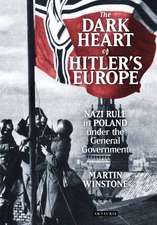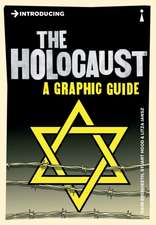Auschwitz, Poland, and the Politics of Commemoration, 1945–1979: Polish and Polish American Studies
Autor Jonathan Hueneren Limba Engleză Paperback – 14 dec 2003
Few places in the world carry as heavy a burden of history as Auschwitz. Recognized and remembered as the most prominent site of Nazi crimes, Auschwitz has had tremendous symbolic weight in the postwar world.
Auschwitz, Poland, and the Politics of Commemoration is a history of the Auschwitz memorial site in the years of the Polish People’s Republic. Since 1945, Auschwitz has functioned as a memorial and museum. Its monuments, exhibitions, and public spaces have attracted politicians, pilgrims, and countless participants in public demonstrations and commemorative events.
Jonathan Huener’s study begins with the liberation of the camp and traces the history of the State Museum at Auschwitz from its origins immediately after the war until the 1980s, analyzing the landscape, exhibitions, and public events at the site.
Based on extensive research and illustrated with archival photographs, Auschwitz, Poland, and the Politics of Commemoration accounts for the development and durability of a Polish commemorative idiom at Auschwitz. Emphasis on Polish national “martyrdom” at Auschwitz, neglect of the Shoah as the most prominent element of the camp’s history, political instrumentalization of the grounds and exhibitions—these were some of the more controversial aspects of the camp’s postwar landscape.
Professor Huener locates these and other public manifestations of memory at Auschwitz in the broad scope of Polish history, in the specific context of postwar Polish politics and culture, and against the background of Polish-Jewish relations. Auschwitz, Poland, and the Politics of Commemoration will be of interest to scholars, students, and general readers of the history of modern Poland and the Holocaust.
Auschwitz, Poland, and the Politics of Commemoration is a history of the Auschwitz memorial site in the years of the Polish People’s Republic. Since 1945, Auschwitz has functioned as a memorial and museum. Its monuments, exhibitions, and public spaces have attracted politicians, pilgrims, and countless participants in public demonstrations and commemorative events.
Jonathan Huener’s study begins with the liberation of the camp and traces the history of the State Museum at Auschwitz from its origins immediately after the war until the 1980s, analyzing the landscape, exhibitions, and public events at the site.
Based on extensive research and illustrated with archival photographs, Auschwitz, Poland, and the Politics of Commemoration accounts for the development and durability of a Polish commemorative idiom at Auschwitz. Emphasis on Polish national “martyrdom” at Auschwitz, neglect of the Shoah as the most prominent element of the camp’s history, political instrumentalization of the grounds and exhibitions—these were some of the more controversial aspects of the camp’s postwar landscape.
Professor Huener locates these and other public manifestations of memory at Auschwitz in the broad scope of Polish history, in the specific context of postwar Polish politics and culture, and against the background of Polish-Jewish relations. Auschwitz, Poland, and the Politics of Commemoration will be of interest to scholars, students, and general readers of the history of modern Poland and the Holocaust.
Preț: 264.31 lei
Nou
Puncte Express: 396
Preț estimativ în valută:
50.58€ • 52.49$ • 42.28£
50.58€ • 52.49$ • 42.28£
Carte tipărită la comandă
Livrare economică 17-31 martie
Preluare comenzi: 021 569.72.76
Specificații
ISBN-13: 9780821415078
ISBN-10: 0821415077
Pagini: 352
Dimensiuni: 152 x 229 x 25 mm
Greutate: 0.5 kg
Ediția:1
Editura: Ohio University Press
Colecția Ohio University Press
Seria Polish and Polish American Studies
ISBN-10: 0821415077
Pagini: 352
Dimensiuni: 152 x 229 x 25 mm
Greutate: 0.5 kg
Ediția:1
Editura: Ohio University Press
Colecția Ohio University Press
Seria Polish and Polish American Studies
Recenzii
“Jonathan Huener has written a magnificent book that will become mandatory reading for everyone interested in the Holocaust, Polish History, Jewish History, or the study of collective memory and commemoration…. This book is full of provocative insights and fascinating analysis, and is certain to generate a great deal of debate and discussion.”—Brian Porter, author of When Nationalism Began to Hate
“Auschwitz, Poland, and the Politics of Commemoration is ... a fascinating and engaging study that makes an important contribution to our understanding of the controversy over memory at Auschwitz and is a highly welcome addition to the growing body of literature on twentieth-century Polish-Jewish relations.”—Slavic Review
Notă biografică
An assistant professor of history at the University of Vermont, Jonathan Huener has written on aspects of memorial culture in postwar Germany and Poland, and is co-editor, with Francis R. Nicosia, of Medicine and Medical Ethics in Nazi Germany: Origins, Practices, Legacies.
Descriere
Few places in the world carry as heavy a burden of history as Auschwitz. Remembered as the most prominent site of Nazi crimes, Auschwitz has had tremendous symbolic weight in the postwar world. Auschwitz, Poland, and the Politics of Commemoration is a history of the Auschwitz memorial site in the years of the Polish People’s Republic.
























